-
 Art of Wellness Acupuncture & Traditional Chinese Medicine (TCM)11704 Wilshire Blvd, Suite 295, Los Angeles, CA, 90025
Art of Wellness Acupuncture & Traditional Chinese Medicine (TCM)11704 Wilshire Blvd, Suite 295, Los Angeles, CA, 90025
myartofwellness@gmail.com310-451-5522 Office Hours
MonClosedTue7:30 am --4 pmWed7:30 am --4 pmThu7:30 am -- 4 pmFri7:30 am -- 4 pmSat7:30 am -- 4 pmSunClosedOur office opens from Tuesdays to Saturdays 7:30 am to 4 pm, will be closed on Memorial day, Independent day, Labor day, Thanksgiving day, Christmas and New year.
-
Recent Posts
- How to Treat Rosacea With Acupuncture and TCM
- How to Treat Perioral Dermatitis With Acupuncture and TCM
- Lymphatic Drainage With Acupuncture and TCM
- How to Treat Turf Toe With Acupuncture
- How to Treat Nerve Pain With Acupuncture and TCM
- How to Treat Watery Eyes With Acupuncture and TCM
- How to Treat Ovarian Cysts With Acupuncture and TCM
- How to Treat Dystonia With Acupuncture and TCM
- Can Acupuncture Help Bad Breath?
- How to Treat Atopy with Acupuncture and TCM
- Plantar Fasciosis Treatment With Acupuncture and TCM
- How to Protect Yourself When Air Quality Is Poor
- How to Treat Spinal Headache With Acupuncture and TCM
- How to Treat Sarcoidosis With Acupuncture and TCM
- How to Treat Flu With Acupuncture and TCM
- Chinese New Year 2025 Year of the Snake
- Sign up to receive news and updates and get my free report:“The Top 10 Reasons to Try Acupuncture”

July 2025 M T W T F S S 1 2 3 4 5 6 7 8 9 10 11 12 13 14 15 16 17 18 19 20 21 22 23 24 25 26 27 28 29 30 31
Migraines
How to Treat BPPV (Vertigo) With Acupuncture and TCM
By Qineng Tan, L.Ac., Ph.D. and Xiaomei Cai, L.Ac. Ph.D.

Dizzy when lying down? Waking up dizzy? Head spinning sensation when you move from one position to another? These could be BPPV symptoms. Benign Paroxysmal Positional Vertigo (BPPV) is a common vertigo cause. Acupuncture and TCM offer an alternative or adjunct BPPV treatment to help relieve positional dizziness.
Benign Paroxysmal Positional Vertigo (BPPV) is one of the most common causes of vertigo, a condition characterized by a feeling that the room is spinning.
BPPV is an inner ear disorder that affects the vestibular system, which controls your sense of balance. BPPV causes you to feel dizzy. The words “positional vertigo” in the name refer to the fact that the dizziness happens after you move your head, either by tilting or turning it, or you get dizzy when getting up from laying down.
Unlike some other forms of vertigo, BPPV is considered relatively harmless; hence the word “benign” in the name. However, its sudden and unpredictable nature can be very unsettling, and have a real impact on your daily life.
BPPV occurs when small calcium particles called otoconia, which are normally located in the inner ear, become dislodged and migrate into one of the ear’s semicircular canals. When these particles move with changes in head position, they can disrupt the normal flow of fluid in the canals, sending incorrect signals to the brain about the body’s position. This mismatch between visual and vestibular signals leads to the characteristic symptoms of BPPV.
What Causes BPPV?
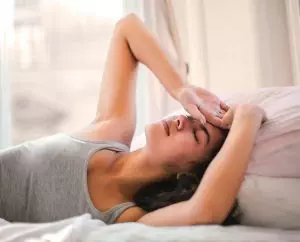
In most cases, doctors do not find a clear BPPV cause when patients see them about recurring dizziness. However, it is possible for certain conditions to possibly cause BPPV. These could include:
- Head injury, head trauma
- Migraine headaches, vestibular migraine
- Meniere’s disease
- Labyrinthitis
Migraine associated vertigo is common, and vice versa; people with BPPV are more likely to experience vestibular migraine, or a migraine headache due to problems with the inner ear. Patients who have BPPV treatment in the form of repositioning, as discussed below, may also be more likely to have migraines afterwards.
Top 10 BPPV Symptoms
That dizzy, spinning sensation is the primary, recognizable symptom of vertigo, but when a person has BPPV, there may be other signs, too. These are the most common symptoms of BPPV:
- Dizziness: Sudden and intense episodes of dizziness, often triggered by changes in head position, such as rolling over in bed or tilting your head back.
- Vertigo: A spinning or whirling sensation, as if the room is rotating around you. This sensation is usually brief but can be severe.
- Light-headed: feeling faint or dizzy.
- Nystagmus: Involuntary, rapid eye movements, typically triggered when changing head position. These eye movements are a hallmark of BPPV and can help doctors diagnose the condition. It may feel like you’re seeing wavy lines or objects around you “jumping” or moving.
- Blurred Vision: the inner ear is connected with the eye muscles, so this imbalance can affect vision, and even cause foggy vision, double vision, and/or sensitivity to light.
- Imbalance: Difficulty maintaining balance, especially when getting up from a lying or seated position. This can lead to unsteadiness and an increased risk of falling.
- Nausea: Some people with BPPV may experience nausea or vomiting, particularly during severe vertigo episodes.
- Fatigue: The unpredictability of BPPV attacks and the effort required to maintain balance during episodes can lead to feelings of exhaustion.
- Anxiety: BPPV can cause anxiety, as individuals may fear the sudden onset of vertigo and its potential impact on their daily activities.
- Tinnitus: Some individuals with BPPV may experience ringing in ear or buzzing in the affected ear, or even hearing loss.
BPPV Treatment and Diagnosis
There really are no lab tests that confirm a diagnosis of BPPV. A doctor will usually perform a test called the Dix-Hallpike maneuver, in which you are asked to turn your head and lie down, and then sit up again 20 to 30 seconds later. During this test, the physician will carefully observe for signs of nystagmus, the rapid eye movement that is one of the classic signs of BPPV.
A doctor may perform other tests like an MRI or CT scan to rule out other possible causes of vertigo.
Sometimes, doctors will recommend a wait and see approach, as many times, BPPV symptoms will resolve on their own in a matter of weeks or months.
Benign paroxysmal positional vertigo treatments can include vestibular suppressant medication. Medications for BPPV aim to provide vertigo treatment that reduces symptoms of dizziness and nausea.
Benzodiazepines, like Valium, may be prescribed because they can help reduce acute vertigo and the sensations of motion sickness. These medications can be habit-forming and have side effects. They also have to be reduced gradually, because of withdrawal symptoms.
Antihistamines, like Benadryl, may be recommended, as they can also reduce feelings of nausea.
Anticholinergics are vestibular suppressants that block receptors in the nervous system. They are used to treat many conditions that involve involuntary movement. However, they can cause a lot of side effects and worsen other conditions like prostate problems, irregular heartbeat or rapid heartbeat, glaucoma, dementia, and depression.
None of these medications address the root cause of dizziness.
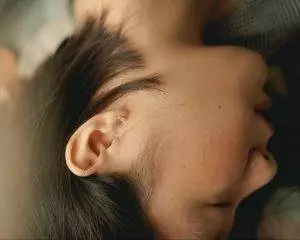
The preferred treatment for BPPV is usually a canalith repositioning procedure (CRP) can be done with one of a few different maneuvers that doctors can perform to try to move the particles in the inner ear that are causing BPPV. These are often helpful in the short term to relieve vertigo, but often patients do have a recurrence of BPPV symptoms again.
For some people, repositioning is not a good option—if you have problems with your cervical spine, or serious cardiovascular problems, for example.
Acupuncture and TCM offer an alternative treatment for BPPV that can relieve dizziness and other vertigo symptoms without any unwanted side effects.
Can Acupuncture Help BPPV?
According to TCM theory, phlegm is one of the pathogenic forces that can take hold in the body, along with things like dampness, dryness, etc. Phlegm builds up when fluids in the body are not being transported and moving the way they should; they get caught in an area and become condensed and thick, causing blockages of energy and movement.
The San Jiao, or “triple burner,” is an important concept used in TCM theory; the San Jiao controls the movement of fluids in the body. In cases of vertigo, phlegm and heat become stagnant due to the malfunctioning of the Jiao. This causes phlegm to be pushed upwards in the body.
In TCM, we may diagnose BPPV and other vestibular problems as having their root cause in a buildup of phlegm in the head that is causing a blockage in the inner ear.
Wind is another pathogenic force that can get into the body and cause problems that seem to come and go. Some cases of dizziness may be due to wind in the head.
Thus, the TCM protocols for BPPV treatment will aim to clear dampness, phlegm, and wind, and get fluids and Qi energy moving again.
Herbs can play an important role in treating vertigo. Chinese herb formulas that warm Yang energy and strengthen the kidneys and spleen can help to clear phlegm.
Use of specific acupoints with acupuncture treatment can help relieve vertigo—sometimes patients feel much less dizziness, even after one treatment. Not only can TCM treatment for BPPV help improve vertigo right away, but regular acupuncture session can help prevent bouts of dizziness from happening.
Acupuncture Near Me for BPPV in Los Angeles, Santa Monica
TCM is a great modality for helping to relieve dizziness due to all types of health conditions, including migraines, POTS, Ehlers-Danlos Syndrome, Meniere’s disease, multiple sclerosis (MS), diabetes, sinus issues, ear infections, and the side effects of medications. Acupuncture can be an excellent alternative for vertigo if other treatments have not helped. Dr. Tan and Dr. Cai at Art of Wellness in West L.A. can help get to the bottom of recurring dizziness, so you can feel steady again.
*This article is for education from the perspective of Traditional Chinese Medicine only. The education provided by this article is not approved by FDA to diagnose, prevent, treat and cure human diseases. It should not stop you from consulting with your physician for your medical conditions. Traditional Chinese Medicine is based on Qi, which is an invisible force that usually cannot be observed by modern science. Because science focuses on testing ideas about the natural world with evidence obtained through observation, these aspects of acupuncture can’t be studied by science. Therefore acupuncture and Chinese herbs are often not supported by double-blind, randomized trials, and they are considered alternative medicine therapies in the United States.
How to Treat POTS With Acupuncture and TCM
By Qineng Tan, L.Ac., Ph.D. and Xiaomei Cai, L.Ac., Ph.D.

Do you often feel shaky, like you’re fainting, or experience dizziness, especially when you’re getting up from sitting down or lying down? Do you feel like you have a rapid heartbeat, or shortness of breath? Postural orthostatic tachycardia syndrome, known as PoTS syndrome, or POTS, is a condition that causes unstable blood pressure when changing positions. Acupuncture and TCM can help relieve dizziness and other symptoms of POTS.
Postural tachycardia syndrome (or postural orthostatic tachycardia syndrome) is a chronic disorder related to the autonomic nervous system that causes people to experience dizziness and increased heart rate when they move into an upright position; this is known as orthostatic intolerance, which is a type of dysautonomia.
POTS syndrome is fairly common, affecting up to 3 million people in the U.S. POTS occurs more often in people assigned female at birth, and often first shows up during the teenage years.
The most common symptom of POTS is feeling light-headed when changing your position from sitting to standing, or when getting up from lying down.
Whenever we have been sitting or lying down for a while, blood pools in the lower parts of the body. When we get up, the autonomic nervous system starts a series of actions to move blood back up into the top half of the body. This involves squeezing blood vessels, and releasing adrenaline and norepinephrine, to make the heart beat faster.
When a person has POTS, more blood tends to pool in the legs, and the nervous system process doesn’t cause the normal, quick response from the blood vessels, so more hormones are released, which can cause the person’s heart rate to increase, and a dizzy, faint feeling.
Medical science has not yet discovered exactly what causes POTS, but there are different characteristics that allow for categorizing these different types of POTS syndrome:
- Neuropathic POTS – damage to small fiber nerves that control blood vessel constriction in the abdomen and limbs
- Hyperadrenergic POTS – when a person has elevated levels of norepinephrine
- Hypovolemic POTS – when a person has unusually low blood levels
- Secondary POTS – when POTS symptoms are related to another condition that causes neuropathy, such as Lyme disease, diabetes, or autoimmune disorders like Lupus or celiac disease.
While POTS is not rare, it can be difficult to get a diagnosis, because the criteria can be vague, and the symptoms can so often be related to other conditions, or just seem “normal.”
For many people, POTS is truly debilitating and can have a serious, negative impact on daily life. It can also contribute to feelings of anxiety and depression. Acupuncture and TCM offer an adjunct or alternative treatment for POTS that can help with dizziness, irregular heartbeat, digestive problems, muscle weakness, migraines, trouble sleeping, and other symptoms, all at the same time.
Top 10 POTS Symptoms
The primary symptoms of POTS are related to the cardiovascular system: rapid heartbeat, and dizziness. However, there can be many other POTS symptoms.
- Irregular heart rate, rapid heart rate, fast heartbeat, chest pain, heart palpitations
- Dizziness, especially when standing up or getting up from lying down, feeling faint
- Breathing problems: hyperventilating, bronchial asthma, shortness of breath
- Constipation, diarrhea, nausea, abdominal pain
- Muscle weakness, muscle pain, tremor
- Skin rash, flushed face, flushing, sweating
- Migraine headaches
- Cognitive issues, brain fog, difficulty concentrating
- Trouble sleeping
- Frequent urination, nocturia
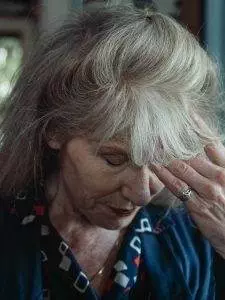
Other symptoms of POTS may include: tinnitus (ringing in the ears), blurred vision, red or purple appearance of the legs when standing up, and a “jittery” feeling or general nervousness.
As with many syndromes, different people will experience different combinations of symptoms. While dizziness and rapid heartbeat are the signs most commonly associated with POTS, many people with POTS will also suffer from abdominal pain and gastrointestinal problems, perhaps without realizing there is a correlation.
POTS symptoms may resemble many other conditions, such as:
- Chronic fatigue syndrome, ME/CFS
- Graves disease
- Other heart conditions that involve tachycardia
- Anemia
- Stroke
- Epilepsy
- Adrenal fatigue
- Drug use
- Eating disorders
- Benign paroxysmal positional vertigo
- Ménière’s disease
Because POTS is often misunderstood or misdiagnosed, many patients will be offered medications to manage headaches, vertigo, or depression, which may not offer much relief.
Medical Treatment for POTS
As there is no definitive cure for POTS, Postural orthostatic tachycardia syndrome treatments typically aim to manage symptoms and improve quality of life.
Dietary modifications are a fundamental component of POTS management. Adequate daily fluid intake is crucial. A diet that includes plenty of salt helps maintain blood volume, aiding blood flow to vital organs. Patients are typically advised to avoid alcohol and carefully monitor caffeine intake, as these substances can exacerbate symptoms.
Exercise is gradually introduced, often starting in reclined or horizontal positions, with the goal of increasing exercise tolerance over time. Physical therapy helps retrain the autonomic nervous system, enhancing blood circulation.
Compression garments can help reduce blood pooling, and specific postures while sitting or sleeping may alleviate symptoms. Identifying triggers such as prolonged sitting, heat, or certain drugs allows for better symptom control. Regular monitoring of blood pressure and pulse, along with adequate sleep hygiene, aids overall well-being.
While no single pharmacological solution is universally effective, some medications may be prescribed based on individual symptoms. These may help to improve blood volume, aid sodium retention, reduce heart rate, and enhance blood vessel constriction.
While POTS symptoms may intermittently improve with medications and lifestyle modifications, the underlying cause of POTS may persist. Acupuncture and TCM treatment can provide a holistic solution for individuals living with POTS, which may help to address the root causes of this syndrome.
Can Acupuncture Help POTS?
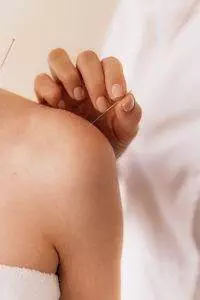
POTS is a kind of Dysautonomia; this is a general term that describes conditions that involve malfunctioning of the autonomic nervous system. This causes people’s bodies to have problems with regulating the sorts of functions that are typically automatic, like the beating of the heart, circulation of blood, breathing, and temperature control.
Western medicine offers some treatments that can help address individual symptoms of dysautonomia, but it does not have a way of treating the root of the problem. It can be difficult to get proper treatment, because people who suffer from POTS and other kinds of dysautonomia often seem reasonably healthy, and their complaints—dizziness, headaches, mental health problems—seem vague.
Acupuncture and TCM have been used to treat these kinds of problems for centuries. Acupuncture treatment can help provide positive effects on the subtle communications of the nervous system, as well as the heart rate, and physiological symptoms of anxiety. According to TCM theory, several organ systems may be involved and need support: not only the heart, but also the kidneys or spleen.
Studies have shown that acupuncture for dysautonomia can help relieve symptoms like heart palpitations, insomnia, and digestive problems.
A qualified acupuncturist is also well-versed in nutrition and can offer more detailed information regarding dietary and lifestyle changes that can help each individual patient. Your TCM provider will spend time learning more about you, so that they can offer personalized advice.
Acupuncture Near Me for POTS in West Los Angeles
TCM and acupuncture can help people with all types of autoimmune disorders, nerve disorders, and conditions involving fatigue and dizziness that may be difficult to solve with conventional methods. Acupuncture works on a deeper, more subtle level to help address complex syndromes. If you are regularly experiencing trouble with feeling light-headed, having unexplained headaches and sleep problems, it may be time to seek a more holistic alternative treatment.
*This article is for education from the perspective of Traditional Chinese Medicine only. The education provided by this article is not approved by FDA to diagnose, prevent, treat and cure human diseases. It should not stop you from consulting with your physician for your medical conditions. Traditional Chinese Medicine is based on Qi, which is an invisible force that usually cannot be observed by modern science. Because science focuses on testing ideas about the natural world with evidence obtained through observation, these aspects of acupuncture can’t be studied by science. Therefore acupuncture and Chinese herbs are often not supported by double-blind, randomized trials, and they are considered alternative medicine therapies in the United States.
How To Help Dependence on Hydrocodone and Other Opioid Pain Medication With Acupuncture and TCM
By Qineng Tan, L.Ac., Ph.D. & Xiaomei Cai, L.Ac., Ph.D.
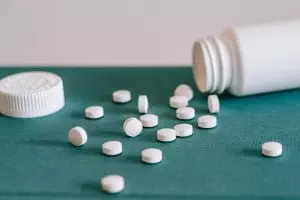
Many people are prescribed strong pain medication when they are in need of pain relief. Opioid drugs may help relieve pain, but they can also create a physical dependence as a person develops a tolerance for the painkillers. Acupuncture and TCM offer an alternative to opiate drugs and opioids like Codeine and Vicodin for treating pain, and a way to help treat both opioid dependence and addiction.
We often hear in the news that the U.S. is facing an “opioid epidemic.” Recent statistics suggest that over ten million Americans may have an opioid use disorder. CDC data showed that over 75,000 people died from opioid overdoses in 2021.
Some of the most commonly used pain medications include:
- Oxycodone (Oxycontin)
- Hydrocodone (Vicodin)
- Oxymorphone
- Morphine
- Methadone
- Fentanyl
- Codeine
- Tramadol
- Buprenorphine
Opioid medications are also known as “narcotics.” “Opiate” drugs are derived naturally from the poppy plant. These include: opium, codeine, and heroin. “Opioids” are synthetically produced in a lab. These include: oxycodone and fentanyl.
People are prescribed opioids or opiates to help them deal with severe pain, but the medications themselves can then become the primary cause of suffering in their lives. Roughly a quarter of people who are prescribed opioid pain medications end up misusing them.
Opioid misuse can mean different things, like: taking more than the prescribed dosage, using someone else’s medication, or continuing to take the medication even though it is having a negative impact on your health and life.
Dependence on opioids is different from addiction, and it is possible to experience drug dependence with or without also having a substance use disorder.
When a person becomes dependent on a medication, it means that they require a certain dose of that substance in order to avoid withdrawal symptoms. This is why these medications are closely monitored by the prescribing medical doctor, so that the dosage is carefully controlled. A person may need to be slowly weaned off the medications when they are no longer necessary, so as to avoid withdrawal.
It is also possible for a person to develop an addiction to opioids, as they stimulate the release of endorphins, which help to block pain signals and produce positive feelings. When this process is repeated over and over, the body starts producing less endorphins naturally, and a higher dosage of the opioid medication is required to produce the same effect; this is what we mean by “tolerance” to the drug.
Addiction to opioids—or an opioid use disorder—is more likely the longer a person takes them—for example, for a chronic pain condition. Other factors, like depression or anxiety, high levels of stress at work or home, and use of other substances like tobacco and alcohol, can also play a role in addiction risk.
It can be difficult, even for doctors, to distinguish between physical dependence and addiction. Addiction is usually defined by “abuse” or “misuse.” When a person feels that they cannot live without the medication, though, there is clearly a problem.
Acupuncture and TCM may play an important role in helping both individuals, and society as a whole, overcome dependence on opioid pain medications because it addresses the problem in several ways.
Top 10 Reasons Acupuncture Is a Good Alternative to Opioids for Pain Relief
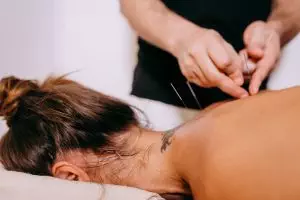
Acupuncture has a natural analgesic effect and can help relieve severe pain and chronic pain, without negative side effects.
- Acupuncture and other TCM modalities are an effective alternative for pain relief.
- Acupuncture can be used to treat both acute pain and chronic pain.
- Acupuncture can help reduce the need for opioid-like medications after surgeries, by helping relieve postoperative pain.
- Acupuncture and herbs can help postoperative wounds heal more quickly.
- Acupuncture can help cancer patients by providing pain relief and additionally helping to relieve nausea and mitigating other side effects of cancer treatment.
- Acupuncture provides pain relief without negative side effects.
- Acupuncture can help individuals who are trying to stop taking opiates avoid withdrawal symptoms.
- Acupuncture can help alleviate cravings for addictive substances.
- Acupuncture helps to effect the release of endorphins naturally, which provides the same good feelings as drugs initially do.
- Acupuncture can be a more cost effective way to treat pain and addiction than other methods.
Treatment for Opioid Dependence
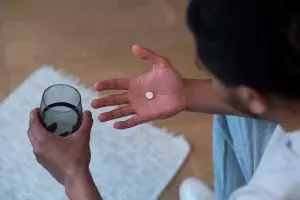
Methadone Maintenance treatment (MMT) is widely used to treat opioid addiction or dependence. This method involves replacing the opioid drug with methadone, which is a synthetic opioid, so it acts on the same centers of the brain, which helps to reduce cravings and withdrawal symptoms. This can help people wean themselves off of pain medications or heroin. However, there can be side effects, and MMT does not help everyone stop using or misusing opiates or prescription pain medications.
Long-term use of opioids can be detrimental to a person’s overall health, both mentally and physically. Hydrocodone side effects and oxycodone side effects can include: drowsiness, dizziness, nausea, vomiting, constipation, irregular heartbeat, and increased risk of respiratory problems for people with asthma or COPDs like emphysema or chronic bronchitis.
Mental health issues and opioid misuse often go together. People who suffer from depression or anxiety are much more likely to use opioids to treat pain and then become emotionally dependent on them.
Overall, evidence suggests that pharmacological methods for treating opioid misuse are not very successful. TCM and acupuncture offer an alternative treatment for opioid dependence.
Can Acupuncture Help Relieve Pain Better Than Opioids?
While there is still much to be done in the way of scientific research to demonstrate exactly how acupuncture is able to effect changes in the body and help relieve pain, there is ample enough evidence to convince the medical community that acupuncture does, indeed, have a significant analgesic effect. For two decades now, the WHO has recommended acupuncture and TCM for many different pain conditions, including:
- neck pain
- back pain
- low back pain
- Sciatica, hip pain
- postoperative pain
- headaches and migraines
- shoulder pain
- heel pain, plantar fasciitis
- TMJ pain
- Neuropathy pain
Acupuncture may work so well to relieve pain because it appears to have an effect on the central nervous system and opioid peptide neurotransmitters, including endorphins. This means that acupuncture works on the opioid receptors in the brain.
One study of patients who were in methadone treatment for opioid dependence found that people who received acupuncture were able to reduce the amount of methadone they needed.
A study on patients who had lumbar spine surgery to help severe back pain showed that acupuncture worked well as a postoperative analgesic.
Acupuncture Near Me for Pain Management and Opioid Dependence in Los Angeles
It is absolutely necessary for so many people to find pain relief when they have an acute condition, or a chronic pain condition, or are in treatment for cancer or other serious illness. Serious pain causes mental anguish as well as physical limitations. Acupuncture and TCM offer an alternative treatment for pain management that helps not only to block pain, but also to relieve stress and anxiety. At Art of Wellness, we have over 30 years of experience helping people to manage pain safely and effectively.
*This article is for education from the perspective of Traditional Chinese Medicine only. The education provided by this article is not approved by FDA to diagnose, prevent, treat and cure human diseases. It should not stop you from consulting with your physician for your medical conditions. Traditional Chinese Medicine is based on Qi, which is an invisible force that usually cannot be observed by modern science. Because science focuses on testing ideas about the natural world with evidence obtained through observation, these aspects of acupuncture can’t be studied by science. Therefore acupuncture and Chinese herbs are often not supported by double-blind, randomized trials, and they are considered alternative medicine therapies in the United States.
How to Treat Meniere’s Disease With Acupuncture and TCM
By Qineng Tan, L.Ac., Ph.D. & Xiaomei Cai, L.Ac., Ph.D.
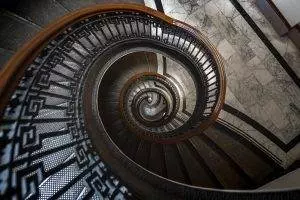
My ear feels clogged sometimes, I get sudden dizzy spells, and sometimes I think I’m losing hearing in one ear! These symptoms could be signs of Meniere’s disease, a condition of the inner ear that causes ringing in the ears or buzzing sounds, sudden hearing loss, and vertigo–that spinning sensation sometimes accompanied by nausea. Acupuncture is an effective vertigo treatment and can help resolve the dizziness and hearing problems associated with Meniere’s.
A lot of people may not realize that they have Meniere’s disease, because the most common symptoms can also be indicators of many other health issues. For example, sudden attacks of vertigo can be caused by a condition called benign paroxysmal postural vertigo, or BPPV. BPPV is another kind of inner ear problem, caused by the movement of small crystals of calcium carbonate into a part of the ear canal where they do not belong. Vestibular migraine and other types of migraine headaches can cause feelings of vertigo and ringing in the ears. Ringing in the ears, also known as tinnitus, can also be a symptom of a sinus or ear infection, thyroid problems, cardiovascular problems, or caused by repeated exposure to excessive noise levels.
Meniere’s disease is a chronic condition that can begin at any time during life, but it is most commonly diagnosed when a person is in their 40s or 50s. Most of the time, Meniere’s symptoms only affect one ear. A “Meniere’s attack” can come on in a way that is similar to a migraine. First there may be subtle signs that it is starting, like changes in hearing, or a feeling of fullness or congestion in one ear. Then, a sudden and strong attack of vertigo can make you feel so dizzy, light-headed, and off balance that you have to lie down. You may even feel nauseated to the point of vomiting. These episodes of intense dizziness can last anywhere from several minutes to several hours, or even a whole day. Afterwards, you may feel exhausted and need to rest. Never knowing when you might have one of these attacks of severe vertigo can be very disruptive and unsettling, really having a negative impact on your life.
Each person’s experience of Meniere’s disease is different, and there is no clear cause for the disorder. Over time, some people may have fewer and fewer symptomatic episodes, while other people may have them more frequently and may begin to develop more serious hearing problems. Hearing loss associated with Meniere’s disease may seem to come and go at first, but it can progress to the point of permanent hearing loss, or deafness.
What causes Meniere’s disease? Medical science is unclear as to why some people develop this inner ear problem, but it is generally believed to be related to excess fluid in the ear. Meniere’s symptoms might develop after some type of head injury or ear infection, respiratory infection, or viral infection. Meniere’s may be related in some cases to migraine headaches, or to immune system dysfunction. Some women experience Meniere’s symptoms during their premenstrual syndrome (PMS) week. As with many other illnesses, Meniere’s can be triggered by stress or anxiety. Currently, Meniere’s treatment typically involves medications that offer some symptomatic relief, like anti-nausea medications.
Acupuncture and other TCM treatments for Meniere’s disease offer a holistic way to address the varying symptoms of dizziness, vertigo, nausea, tinnitus, and hearing loss. While there is no cure for Meniere’s, it is possible to reduce the symptoms so that they are not so bothersome anymore and even to help prevent further hear loss.
Top 5 Symptoms of Meniere’s Disease

Meniere’s symptoms can be subtle at first, and a person may only have a few episodes of ringing in ear or vertigo once in a while. The common signs of Meniere’s include:
- Dizziness, vertigo, spinning sensation, light-headed
- Hearing loss, hearing problems, sudden drop in hearing, sounds are muffled
- Tinnitus, ringing in the ears, buzzing sound, roaring in ear
- Sensation of fullness in the ear, ear feels plugged up or congested
- Nausea, feeling like you’re going to be sick or vomit
In some cases, people with Meniere’s can have sudden falls, sometimes called “drop attacks,” or Tumarkin’s otolithic crisis. You may feel like you’re falling, or the room is tilting around you, and the next thing you know, you’re on the floor. These falls are unpredictable and can cause injuries.
Medical Treatment for Meniere’s Disease
One of the common treatments for Meniere’s vertigo, ringing in the ears, or a sensation of fullness in the ears is the use of diuretics like Lasix, Diamox, or Dyazide, following the logic that they will help reduce the amount of fluid in the inner ear. However, there is not much scientific evidence showing that this method works for everyone, and diuretics may have other negative consequences, such as lowering blood pressure.
Anti-nausea medications, known as antiemetics, may offer some relief from nausea during bouts of vertigo. Histamines and their receptors are understood to be involved with signalling in the brain that may impact balance, so antihistamines, such as Dramamine and Benadryl, are often offered as a way to reduce dizziness. Again, there is not much evidence of the efficacy of antihistamines for vertigo. Drowsiness is a common side effect of taking antihistamines. Antidepressants are also sometimes prescribed to help with vertigo.
In rare instances, doctors may perform surgery to physically alter the inner ear; this is called labyrinthectomy. This may help reduce debilitating vertigo for some patients or help to prevent drop attacks, but for some people, it can cause even more damage to their hearing capabilities, and can even cause deafness. All of these medical treatments only try to reduce symptoms, they don’t help to prevent hearing loss due to Meniere’s disease.
Can Acupuncture Help Meniere’s Disease?

According to TCM theory, the sensation that the ear is clogged is related to a buildup of Phlegm, causing both physical obstruction and blocking the flow of Qi (energy). Dampness and Wind are other pathogenic factors that can contribute to Meniere’s symptoms of dizziness, vertigo, and the ringing or whooshing sounds in the ear. Weak Kidney energy, combined with Wind rising from the Liver, can cause dizziness, tinnitus, and headaches. An acupuncturist will listen carefully to find out which symptoms are arising, and when, and will choose acupuncture points on the head to directly address the obstruction in the ear, as well as other points on the body to address issues with Kidney Qi.
It may be helpful to make certain dietary changes to help address the excess fluid involved in Meniere’s disease, including reducing salt and sodium, and limiting caffeine and alcohol. Your acupuncture provider will discuss nutritional choices that will help to relieve Meniere’s symptoms.
One study of Meniere’s patients treated with acupuncture showed not only that their vertigo had subsided after a few treatments, but that their hearing levels were maintained rather than worsening as treatment went on.
Another study compared patients with Meniere’s who were treated with antihistamines to a group of patients who received acupuncture treatment for 12 weeks in addition to the antihistamine medication. The patients who received acupuncture reported significantly less vertigo and dizziness, less tinnitus, and actual improvements in their hearing over the patients who received medicine only.
A review of studies using TCM methods, including acupuncture treatment, moxibustion, cupping, and herbal supplementation, to treat Meniere’s disease found that symptoms of vertigo and dizziness were, by and large, greatly reduced, to the point of patients reporting their vertigo as being fully resolved.
A study in which patients were given acupuncture and herbs for 10 days resulted in a 95% effective rate, with the majority of people treated reporting no symptoms at all after the treatment, even after a two-year follow-up.
Acupuncture Near Me for Meniere’s Disease in West Los Angeles
Vertigo is a deeply unpleasant sensation, and never knowing when an attack of dizziness and nausea may strike can really disrupt your daily life. TCM has a proven track record of effectively helping people get over symptoms like dizzy spells and ringing in the ears, and may even help to prevent further hearing loss. If you know you have Meniere’s disease, or if you have some combination of these symptoms but aren’t sure what’s going on, it may be a good time to visit a qualified acupuncturist to see if acupuncture can help relieve dizziness due to Meniere’s, migraines, or BPPV.
*This article is for education from the perspective of Traditional Chinese Medicine only. The education provided by this article is not approved by FDA to diagnose, prevent, treat and cure human diseases. It should not stop you from consulting with your physician for your medical conditions. Traditional Chinese Medicine is based on Qi, which is an invisible force that usually cannot be observed by modern science. Because science focuses on testing ideas about the natural world with evidence obtained through observation, these aspects of acupuncture can’t be studied by science. Therefore acupuncture and Chinese herbs are often not supported by double-blind, randomized trials, and they are considered alternative medicine therapies in the United States.
How to Treat Toothaches With Acupuncture and TCM
By Qineng Tan, L.Ac., Ph.D. & Xiaomei Cai, L.Ac., Ph.D.
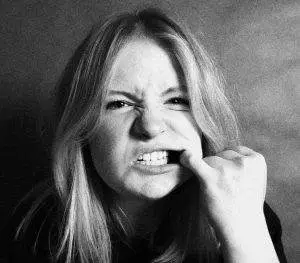
Sharp tooth pain, toothache, or throbbing pain in teeth usually means you need to see the dentist. The pain of dental work often necessitates the use of anesthetics, while post-operative pain from dental surgery is usually treated with over the counter pain medications or opioid painkillers. Acupuncture offers an alternative way of dealing with dental pain and can also relieve the dental anxiety many people experience when they have to have dental work done.
Oral pain makes it hard to eat, hard to talk, hard to even think straight. Mouth pain felt in relation to problems with the teeth, or a hurting tooth, is often nerve pain that may be sharp in one place, or radiate to other parts of your face and head. Acupuncture acts upon the neurotransmitters that carry signals between parts of the body and the brain, helping to block pain sensations and relieving tooth pain.
Different types of mouth pain, not necessarily related to dental problems or the teeth, can also be alleviated by acupuncture, including TMJ jaw pain, clicking or locking of the jaw, tension from grinding teeth, and dry mouth (xerostomia). Myofascial pain, pain in the muscles of the face, and migraines that cause pain in the neck and side of the head can also be helped with acupuncture treatment.
Acupuncture and herbs do not replace the need for regular dental visits or necessary dental procedures. However, TCM methods, used in conjunction with good oral hygiene, can help to promote the development of strong teeth in children, and the maintenance of healthy teeth and gums in adults. TCM treatments help improve immune function, as well, which can help prevent mouth infections.
While dentists have a variety of anesthetics they can use to help reduce pain during dental procedures, many people find the injection of anesthetic to be painful and anxiety-inducing in and of itself. There are definitely downsides to the pain relief offered during dental visits, so much so that many people avoid going to the dentist, or at the very least wish there was some alternative form of anesthesia. Recently, there is growing interest and research to show that acupuncture can be an effective means of providing pain relief before, during, and after dental procedures.
It is estimated that up to 30% of people report feeling dental anxiety, while about 10% of patients experience dental phobia. Acupuncture has been shown to help produce a clinically significant decrease in feelings of anxiety or fear of going to the dentist.
Managing Dental Pain
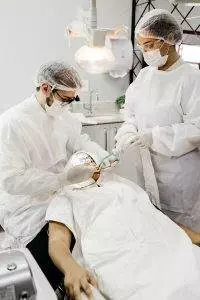
It is common to experience pain while you are waiting to get into the dentist for a toothache caused by a broken filling or because a crown has fallen out. Most dental pain is usually managed with non-steroidal inflammatory drugs (NSAIDs), also known as OTC pain medications like ibuprofen and acetaminophen. However, some people cannot tolerate the regular use of these medicines, as they can cause damage to the lining of the stomach.
Different types of anesthesia used during dental work include:
- local anesthetics (lidocaine, articaine, etc.), which numb the area where a tooth is being worked on
- sedation (nitrous oxide gas, Valium, Versed, etc.), which helps relax the patient
- general anesthesia, which means a patient is rendered unconscious for the duration of the dental procedure
Pain after oral surgery is most often treated with over the counter analgesics like ibuprofen or acetaminophen, but severe dental pain may be treated with opioid painkillers. Dentists in the U.S. are far more likely to prescribe opioid pain medications than they do in other countries. Dentists are also more likely to prescribe long-acting opioids, and to prescribe opioids for a longer period of time. The growing numbers of people addicted to opioids in America is largely due to over-prescription of these drugs. TCM methods like acupuncture can relieve a toothache and reduce post-operative pain and bleeding without side effects or risk of dependence.
Can Acupuncture Help Tooth Pain?
Acupuncture treatment has an analgesic effect, reducing pain and inflammation of all kinds. Acupuncture not only offers natural pain relief for toothache, but can also help reduce bleeding during dental procedures such as tooth extractions.
A controlled study that compared two groups of patients have teeth extracted, one group treated with articaine hydrochloride injections and the other groups treated with acupuncture needles, found that pain relief was comparable between the anesthesia and acupuncture groups, while bleeding was less amongst those patients given acupuncture.
In addition to helping with pain and bleeding during and after a dental procedure, many people find it helpful to come in and have an acupuncture treatment just prior to their dental appointment in order to help alleviate anxiety. Acupuncture may also help to reduce a person’s gag reflex, which can be easily triggered during fittings for orthodontic devices, or impressions.
With acupuncture treatment, we can also effectively treat dental anxiety, allowing for patients to feel more relaxed going into their dental appointment and feel less pain during and after a dental procedure.
Top 3 Pressure Points to Help Tooth Pain
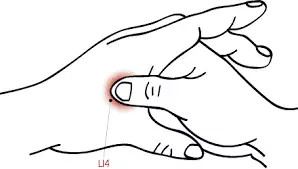
Acupressure has been shown to help reduce anxiety, gag reflex, and the need for dental injections for pain during fittings for prosthetics. Specific points on the head and face, in particular, can help relieve toothache and swelling.
If you are experiencing acute tooth pain, plan to see your dentist as soon as possible. In the meantime, using these acupressure points for toothaches can help you stay calm and alleviate the pain until you can get treatment.
- ST6, Stomach Meridian Point 6, is located in the cheek, equidistant between the corner of the mouth and the earlobe. Apply pressure to the jaw muscle here to help relieve toothache and jaw pain.
- SI18, Small Intestine Meridian Point 18, is right in the cheek hollow, perpendicular to the corner of the eye and outside of the nose. Apply pressure to this point to help relieve tooth pain and swollen gums.
- LI4, Large Intestine Meridian Point 4, is located in the webbing between the thumb and index finger. Squeeze with firm pressure here. Often used to relieve headaches, but this point helps tooth pain, as well.
Acupuncture Near Me for Tooth Pain on the Westside of Los Angeles
No one likes going to the dentist. However, if you have a hurting tooth but you’ve been avoiding the dentist out of fear, or if you know you have to have some major work done, and you are dreading it, please consider scheduling an acupuncture appointment before your next dentist appointment. Discover for yourself how acupuncture can help relieve dental anxiety and post-procedural dental pain. You may find you feel much more relaxed about the whole thing, and herbs and acupuncture can help staunch bleeding and speed recovery after dental work.
*This article is for education from the perspective of Traditional Chinese Medicine only. The education provided by this article is not approved by FDA to diagnose, prevent, treat and cure human diseases. It should not stop you from consulting with your physician for your medical conditions. Traditional Chinese Medicine is based on Qi, which is an invisible force that usually cannot be observed by modern science. Because science focuses on testing ideas about the natural world with evidence obtained through observation, these aspects of acupuncture can’t be studied by science. Therefore acupuncture and Chinese herbs are often not supported by double-blind, randomized trials, and they are considered alternative medicine therapies in the United States.